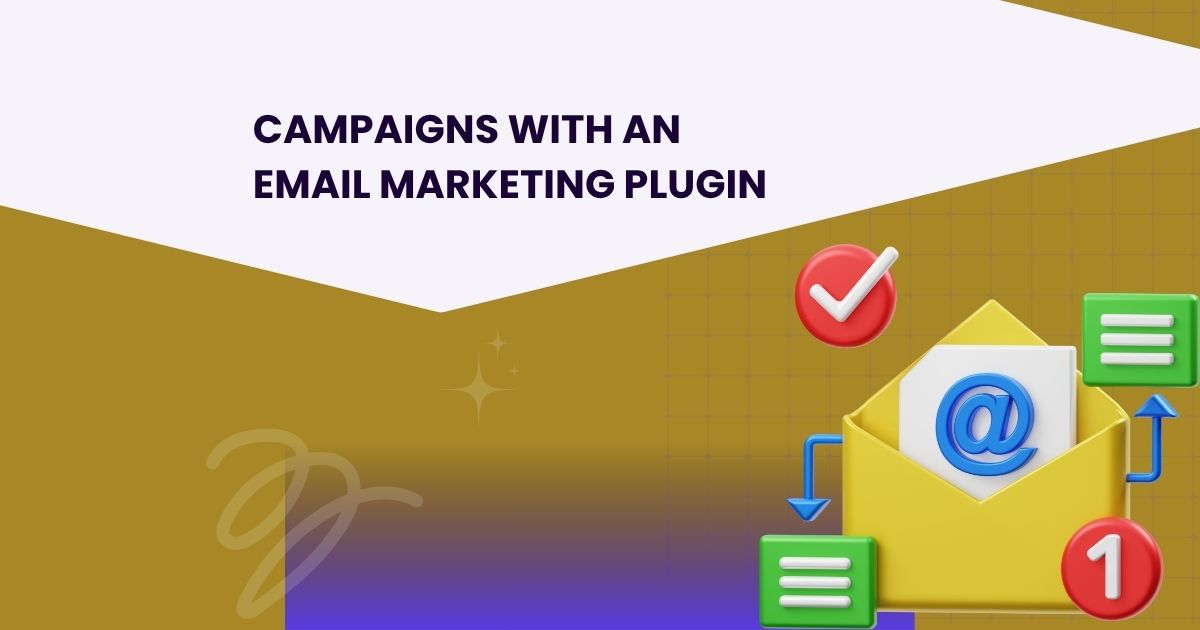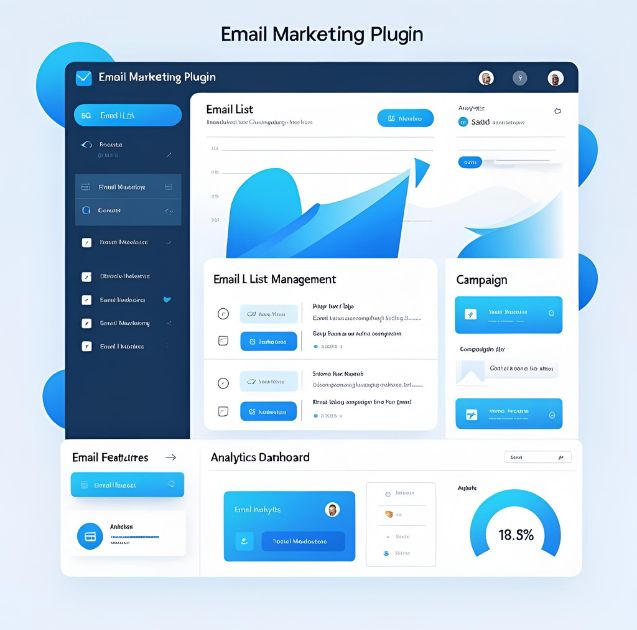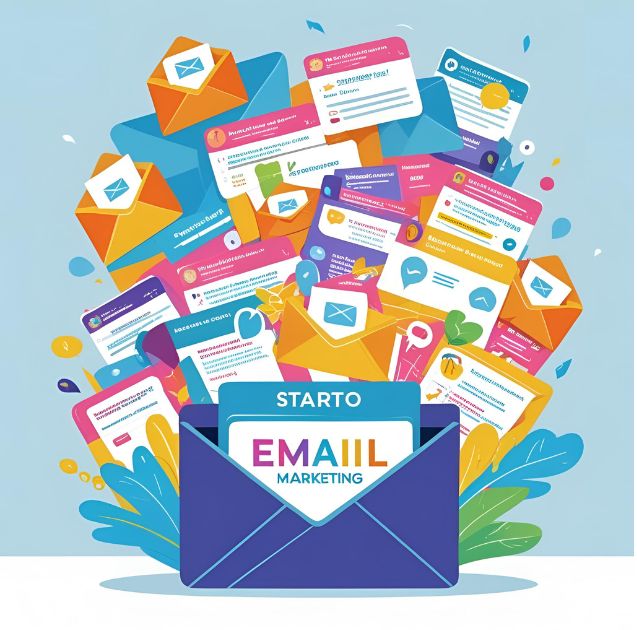
Email marketing is a powerful tool for connecting with your audience, driving engagement, and ultimately, boosting sales. But when you’re juggling dozens of tasks, from writing content to analyzing stats, managing email campaigns can feel overwhelming. That’s where email marketing plugins come in. These handy tools integrate with your existing platforms, streamlining your workflows and supercharging your email game.
If you’re curious about what email marketing plugins can do for your business and how to choose the right one, you’re in the right place.
What Is an Email Marketing Plugin?

An email marketing plugin is software that connects with your website or content platform (such as WordPress, Shopify, or Salesforce CRM) to help you create, automate, and optimize email campaigns. Think of it as your personal assistant for email marketing. It handles tasks like designing emails, collecting leads, managing subscribers, and tracking performance.
Rather than managing emails in a standalone platform, a plugin integrates emails directly into your current systems, saving you time and helping ensure no leads slip through the cracks.
Why Do You Need an Email Marketing Plugin?
Email marketing plugins aren’t just for convenience; they’re powerful tools with measurable benefits for businesses of all sizes. Below are some compelling reasons to use one:
1. Automates Tedious Tasks
Manually collecting emails or segmenting subscribers is so last decade! Plugins can automate:
- Welcome sequences
- Abandoned cart emails
- Post-purchase follow-ups
With automation, you maintain engagement with customers without lifting a finger.
2. Improves Subscriber Management
Keeping tabs on growing lists of subscribers can get tricky. Good email plugins allow you to:
- Create segmented lists (e.g., new customers vs. VIPs)
- Manage opt-ins/opt-outs
- Ensure GDPR compliance through double-opt-in processes
3. Streamlined Analytics
With insights like open rates, CTRs (Click-Through Rates), and conversion stats, email plugins cut down the guesswork and help you make data-backed decisions.
4. Boosts Email Engagement
Marketing emails are only effective if they’re opened. Many plugins offer A/B testing, personalized subject lines, and dynamic content to make your emails stand out in cluttered inboxes. Fun fact? Emails with personalized subject lines are 26% more likely to be opened!
Key Features to Look for in an Email Marketing Plugin
Choosing the right email marketing plugin boils down to what features and integrations will best serve your business. Here are a few must-haves:
1. Drag-and-Drop Email Builder
The best plugins come with intuitive editors, allowing you to design professional emails—even if you’re not a graphic designer.
2. Automated Workflows
Look for plugins offering pre-built workflows so setting up actions like lead nurturing or post-purchase emails takes only minutes.
3. List Management
Segment your audience based on preferences, behavior, or demographics. The more targeted your email lists, the higher the likelihood of engagement.
4. Reporting and Insights
From open rates to bounce rates, the plugin should provide detailed analytics to improve your campaigns over time.
5. Third-Party Integrations
Ensure the plugin is compatible with platforms you already use, whether that’s Shopify for e-commerce or Salesforce CRM for customer management.
6. Scalability
Choose a plugin that can scale as your subscriber list grows. The last thing you want is to outgrow a plugin too quickly.
Top Email Marketing Plugins You Should Know
Now that you know how an email marketing plugin can transform your business, here are some top options that deliver exceptional results:
1. Mailchimp for WordPress
- Best for: Small businesses or beginners.
- Features: Custom sign-up forms, integration with WooCommerce, and email campaigns tailored to customer behaviors.
- Bonus: Free plan available for up to 500 subscribers.
2. HubSpot Email Marketing
- Best for: Brands seeking a comprehensive CRM and email solution.
- Features: Drag-and-drop editor, email automation, and detailed subscriber metrics.
- Bonus: Free CRM included!
3. Sendinblue
- Best for: Companies looking for multi-channel capabilities like email and SMS.
- Features: A/B testing, email templates, and ready integrations with Shopify.
- Bonus: SMS functionality for added reach.
4. Constant Contact
- Best for: E-commerce or event-heavy businesses.
- Features: Event RSVP tools, social media integrations, and image libraries.
- Bonus: Straightforward, user-friendly interface.
5. ConvertKit
- Best for: Content creators like bloggers, coaches, and YouTubers.
- Features: Subscriber segmenting, email funnels, and personalization options.
- Bonus: Strong community support for small businesses.
How to Get Started with an Email Marketing Plugin

Integrating an email marketing plugin into your workflow can be a seamless process if you follow these steps:
Step 1. Determine Your Goals
Are you looking to generate leads, increase sales, or nurture existing customers? Clarifying your objectives will guide your choice of plugin.
Step 2. Choose Your Plugin
Refer to the list above and choose a plugin that aligns with your goals, budget, and current tech stack.
Step 3. Set It Up
Install the plugin on your corresponding platform (e.g., a WordPress site). Ensure proper integration by linking it to your CRM or e-commerce tools.
Step 4. Import Your Contacts
Upload your existing email list, making sure they’re segmented for tailored messaging.
Step 5. Create Your First Campaign
Using the plugin’s editor, design a simple but engaging email (consider adding a clear Call-To-Action (CTA) like “Shop Now” or “Learn More”).
Step 6. Test and Optimize
Always test your campaigns to see what works. Experiment with subject lines, images, and sending times.
Real-Life Success Story
Case Study
Business: Brew Beans, a small coffee subscription service.
Plugin Used: Mailchimp for WordPress
Key Results: By using automated workflows for abandoned cart emails, Brew Beans recovered 27% of potential lost sales within three months. Further, segmentation based on customer preferences (dark roast vs. light roast lovers) saw email open rates jump to 45%.
Take the Next Step
An email marketing plugin is no longer a luxury for businesses; it’s a necessity. By streamlining your email campaigns, boosting personalization, and delivering actionable insights, these tools help businesses consistently engage with their audience and drive results.
Want to reap similar benefits for your business? Start by picking the right plugin and watch your marketing efforts flourish.


















No Comments